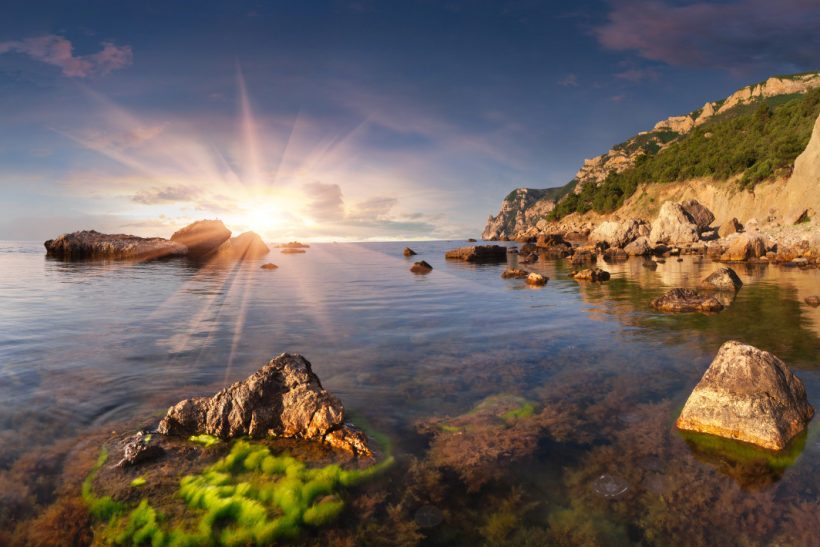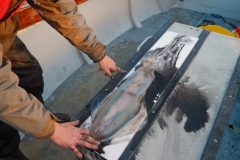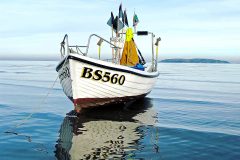Invest in fishing?
To meet three generations of fishermen in one day is a rare privilege, rarer still when those fishermen are from the same family – the Eglinton family of Newquay in Cornwall.
To have known them for some time is an even greater privilege.
Ron Eglinton (90), his son Gary, and his grandson Ben are part of a determined group of fishermen who work from one of the most unlikely, and often harshest, commercial fishing ports in the UK. The neighbouring port of shelter, Padstow, is a considerable distance away, and spending 180 days at sea per year is quite good for a Newquay inshore boat.
Catching bass by hook and line and/or by net has, for generations, been a major part of the calendar year for Newquay fishermen, and contrary to the beliefs of DEFRA, Newquay fishermen, like many other UK inshore fishermen, need to be able to switch methods when necessary. Current bass restrictions have hit the Newquay fishermen hard. The Eglinton family is one example; just one of the family’s three boats, Ron Eglinton’s 19ft Tol-Bar SS 40, currently has bass entitlement.
Between the three men, there is sufficient knowledge and experience to make a good living from catching shellfish and whitefish, driving a warship and, if necessary, building their own fishing boat!
Featured in Fishing News (24 May, 2018), Ben Eglinton laid down his tools as a chief engineer in the Royal Navy to return to the family tradition of being a fisherman. His father Gary has considered retiring, but that’s on the ‘back burner’, I was told. And after serving over seven decades at sea, one would imagine Ron would have retired some years ago. Try keeping him ashore if he spots bass from the headland!
Recently, I asked Ron if he would ‘spill the beans’ on what made him determined to succeed in fishing, and why on earth he chose to do so from a harsh port like Newquay.
I met Ron over 30 years ago, and recently rediscovered my old black and white pictures of when the legendary Eglinton boat, the 12m Lamorna SS 28, was launched from John Moore’s boatyard at Mevagissey in 1986.

Tol-Bar leaving Newquay.
Skipper Ron Eglinton spent many years as a member of the Cornwall Sea Fisheries Committee (SFC), and his ability to put his point across was notable. Together with other committee members like skipper Billy Hocking from Looe, he was a force to be reckoned with. If non-fishing committee members were more interested in scoring political points than in listening to common sense, Ron Eglinton and Billy Hocking didn’t suffer fools gladly. However, they never lost their focus on raising the awareness of the general public, and encouraging them to support the region’s fishing industry.
During committee meetings, if a point of importance was made, their eyes would turn to the press table – where we reporters sat – and I can assure you, we listened carefully.
Here’s what Ron Eglinton had to say about 70-plus years of being a full-time Newquay fisherman.
“Newquay is now a totally different place. It has little resemblance to when I started fishing. There’s no comparison between fishing then and fishing now; we now have excellent facilities, an efficient ice supply on site, refrigeration, and cranes to get the catch ashore. We never had anything like that, and such progress can only be good.
“In my mind, for the inshore fleet at places like Newquay, there is a good future ahead, but not while some of today’s regulations are in force. Newquay is like most small ports in Britain; every boat in its fleet doesn’t carry out just one type of fishing. Inshore fishermen need the opportunity to move from shellfish to fish, or vice versa. They need to have this ability to manoeuvre in order to survive. When the conditions change, as they now are doing, different fisheries must be available.
“One example is with my boat, the Tol-Bar. Because I have the ‘bass entitlement’, I am allowed to catch bass by hook and line only, but Gary (skipper/owner of Shannon SS 45) doesn’t have a bass entitlement, and neither does Ben on the Beryl M SS 8 – but all through their lives, they have both fished commercially for bass.
“Bass is an important fish to Newquay fishermen, and just because the boats were not fishing for bass during the time that the government stated, that fishery has now been totally closed to them. And I question why my bass entitlement is for hook and line only. I can no longer go netting for bass, but throughout my fishing life, for short times each year, I have net-fished for bass.
“And this unfairness of the bass regulations doesn’t just apply to my boys; the bass regulations are now a disaster for so many small-boat fishing communities around the UK. Like all of those fishermen, we love our bass fishing, and nobody wants to see huge amounts of bass discarded – and that is the only result that will come from these regulations.

The 12m Lamorna SS 28 was launched from John Moore’s boatyard at Mevagissey in 1986.
“I can accept that for some markets, like the high-end restaurants, line-fishing for bass is the way forward, but that is a very small part of the overall market.
“Because the entitlement is linked to the boat and not to the licence, if Gary and/or Ben want to go bass fishing, they have to take my boat and stay with hook and line. The present bass restrictions have taken away from so many men the right to continue fishing for bass, something they have done for many years.”
Shellfish being the mainstay of many Newquay boats, Ron Eglinton reflected on his years of potting.
“Potting on the north Cornish coast is now so different, and it’s not doom and gloom. If we are talking about lobsters, in my mind – and contrary to what many people claim – there are now far more lobsters than before. When I started, you would be lucky to land a box of lobsters per week; we didn’t fish far off, the shores had very little suitable ground, and lobsters were not as important as they are now. But now, even with the boats being far more efficient, fishing further out on more suitable ground, and using more gear, there are plenty of lobsters, and long may it last.
“I remember when, within its region, Cornwall SFC decided to ban the retention of berried lobsters – I think it was the first SFC to do that. It was a long time ago, and when it was first discussed, I wasn’t sure whether it was the right way ahead. For some skippers, it cut down the income for a while, but it did work, and today’s skippers, like Gary, are pleased that it did go ahead. He and many more now welcome anything like that – on the whole, today’s inshore fishermen are all for conservation, and that’s a good thing.
“I enjoyed my days on the Cornwall SFC; I learned a lot. I spent a lot of time sitting on a lot of committees, but Cornwall SFC was the grandest. I was retired from Cornwall SFC before IFCAs took over. I was concerned about the changeover, and still worry about how the balance of IFCA committees changed so enormously, and how so many fishermen with important experience and knowledge were replaced by people who have much less knowledge of the inshore waters.
“However, that is now changing, and I now see more members elected from the fishing industry, and that is very good news – people like Newlyn skipper Andrew Pascoe, with vast experience and valuable advice. We need more such voices from the industry.
“But going back to my early shellfishing from Newquay – a lot less crab was taken, not because the stocks were lower, but because we just didn’t have the markets. The demand for crab wasn’t good enough to support a fleet like we have today. There was a summer demand for white meat, and we used to keep the big jacks, but many times there was a lot less call for hen crab. But that changed; shellfish export began, and more crab was in demand, so hens became important. In the early days, a lot of the edible crab had black spots on the shells (black necrotic disease), but harder fishing got rid of that, and that too was a good move.
“One of the biggest changes in shellfishing was a demand for spider crab. In the early days, spider crab was a nuisance, but when the export market grew, we could land a tonne per day. Shellfish merchants calling for spider crab was one of the biggest boosts to the Newquay fleet.
“There are things that concern me about the future of shellfishing – a rule on the number of pots that you can fish being one. I favour a limit of pots per man rather than a quota, and a figure of 300 pots per man seems about right. Covering the seabed with pots is no good for anybody.
“Looking back, fishing has been good to me. I’ve no complaints about fishing – look after your boat, look after your gear, and if your heart is in the job, you won’t go wrong.
“I think the Newquay fleet is about as big as it can realistically be, and when I see all the things going on, I remember what the port was like in my younger days. We didn’t have Rolls-Royce trucks like the skippers have today; we had old Post Office vans, and thought they were fantastic.
“It’s always important to add fun to fishing, and see the better side of things, and I think the best times we saw were the days of the winter mackerel boom in the 1970s – very successful days. We were all fishing from ports like Falmouth or Newlyn, and with that fishery there were so many people taking part that we made lifelong friends – and we made very good money. I think that we were the first boat of its size to make £1,000 in one day. But that was only one day!
“From getting up in the morning, travelling to Falmouth, steaming to be out on the grounds before first light, then spending an entire day hand-lining, and landing the fish, it was very long hours – but for Newquay fishermen, to be working during the winter months was a new thing, and a big boost to the earnings.
“Before Newquay harbour was improved, you couldn’t keep a boat working all year round from Newquay. At times, it was a very dangerous place. Those days on the mackerel were fantastic, though I can’t say that it didn’t have worrying times. With the Lamorna – the first Lamorna – I always felt safe, but that was tested one day.
“We – four hands – were fishing on the mackerel shoals around Land’s End, and had had a good day. We began steaming back, and at first things were OK, but the wind strengthened, it became a nasty sou’west wind, and together with the ebb tide, the seas worsened. The waves became steeper, and it wasn’t long before I saw a hole – a gap between two waves – that was huge.
“I had no time to do anything about it. The boat fell down into that hole – a really deep hole. The boat shuddered and fell onto its side, and water came in over the gunwales, and because the boys were grading mackerel on deck, the scuppers were blocked with fish – the water couldn’t drain away fast enough.
“The only way I can describe it is that for some reason, the boat then shook herself and righted – a testimony to John Moore’s boats. Eventually, we got back to port; we were lucky, very lucky.”






